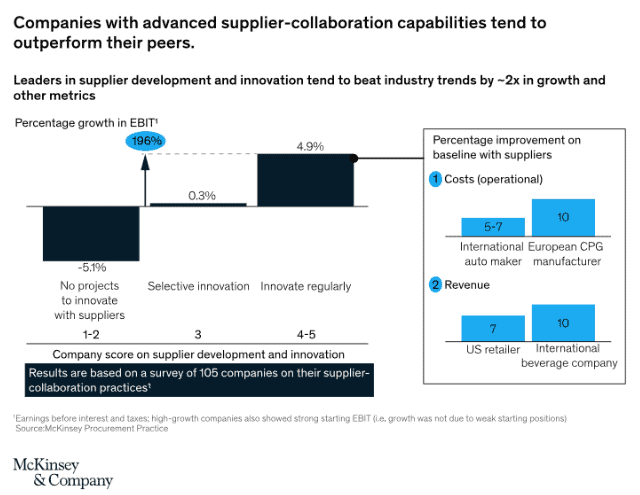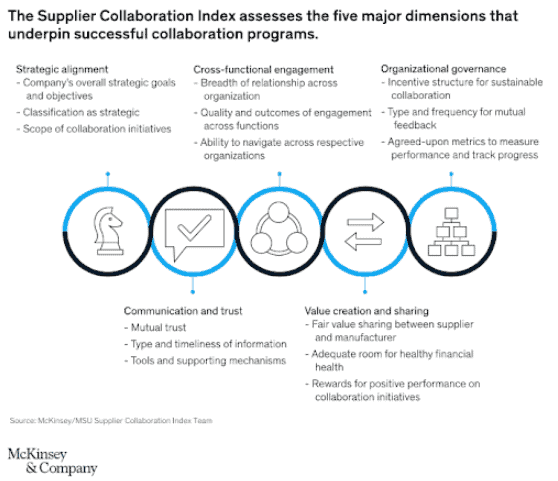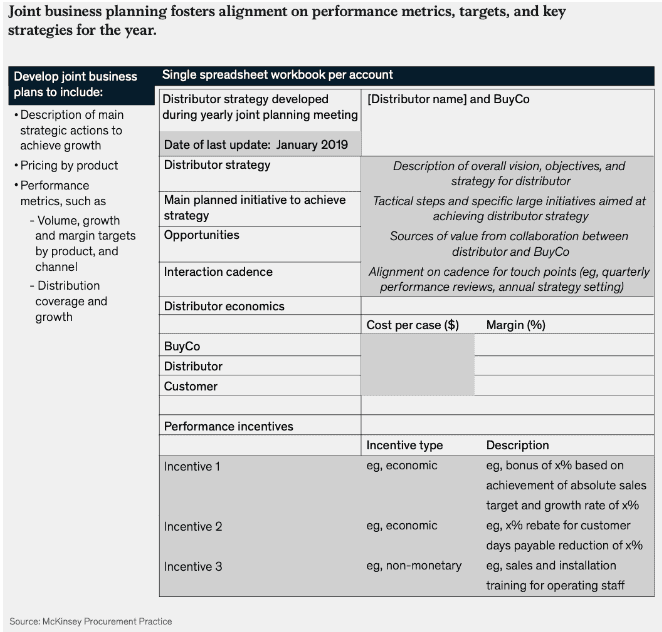Supply chain collaboration is essential for business success. Why? Because, in the modern, globalised world, companies aren’t just competing at the business level – but at the supply chain level as well.
If all companies in the chain work cohesively together to deliver quality products to the end customer at the right time and right price – everybody wins.
On the other hand, if effective collaborations are not established and supply chain partners do not work together constructively, all companies will lose out to another, better-functioning supply chain.
Unlocking Value in the Supply Chain
Building efficient and cooperative supply chain strategies with all collaborating partners leads to significant competitive advantage in more ways than one.
In fact, research has shown that when collaboration efforts and supply chain performance are strong, companies enjoy significantly reduced costs as well as improvements in speed and customer satisfaction. A recent study by McKinsey & Company reveals that successful collaborations between buyers and sellers create significant value for all participants.
“Buyers and suppliers can work together to develop innovative new products, for example, boosting revenues and profits for both parties,” write Ashish Kothari et al. for McKinsey. “They can take an integrated approach to supply-chain optimisation, redesigning their processes together to reduce waste and redundant effort, or jointly purchasing raw materials. Or they can collaborate in forecasting, planning, and capacity management – thereby improving service levels, mitigating risks, and strengthening the combined supply chain.”
The report cites hard evidence of the advantages of supply chain collaborations. In a survey of more than 100 organisations across multiple sectors, it was found that companies with advanced supplier-collaboration capabilities demonstrated higher growth, lower operating costs and greater profitability than other competitors in their sector.

Changing Mindsets – Improving Supply Chain Collaboration
Despite the benefits, cost reductions and long-term competitive advantage effective supply chain collaborations can bring, there are still a number of challenges in trying to access them.
As McKinsey notes, supplier collaboration efforts require significant investment in time and management from supply chain managers before they generate value. The reason is that supply chain collaboration involves close and often intense cooperation from cross-functional teams on both sides of the relationship.
This may require a fundamental change in mindset and a commitment to swift and transparent information sharing between buyers and suppliers – who, as McKinsey points out, may be used to more transactional or even adversarial relationships. As a result, supply chain executives often choose to focus more on short-term gains through simpler and faster initiatives – even though they are worth less in the long run.
The 5 Key Underpinnings of Successful Supply Chain Collaboration Programmes
Ultimately, what McKinsey’s study reveals is that successful supply chain collaboration hinges upon getting the buy-in and long-term commitment from leaders and decision-makers. With leadership and supply chain executives on board, buyers and suppliers can start working towards a “shared perspective” for how to succeed together in the market.
A culture founded in proactive communication and information-sharing must be fostered, through which buyers and suppliers can jointly create strategies, agreements and performance-based incentives that benefit both parties.
The study identifies five major dimensions that underpin successful supplier collaboration programmes, outlined in the graphic below.

In any link in any supply chain, buyers and suppliers have a strategic importance to each other. As a buyer, the more sales you can make to your customers, the more volume you will need to purchase form your suppliers, resulting in positive financial outcomes for both parties.
What’s required, therefore, is for buyers and suppliers to engage in joint business planning initiatives – defined by McKinsey as collaborative planning processes in which the company and its supplier align on short- and long-term business objectives, agree on mutual targets and jointly develop plans to achieve set objectives.

There are many different ways buyers and suppliers can get started with joint business planning – from aligning on metrics, to transaction integration, to devising rebate programmes and incentive structures to bolster the collaboration effort.
All, however, are facilitated by fast communication and transparent information sharing – which require investment in the right digital tools and solutions.
Agreeing to collaborate on working towards mutual goals is almost impossible without a digital contract management system that centralises all agreements you make with your suppliers for easy access, analysis and performance tracking. One of the best technologies to facilitate greater transparency and information sharing with suppliers is rebate management software.
A complete end-to-end contract management solution, rebate management software provides a cloud-based platform for drafting, negotiating, agreeing, reviewing and updating agreements with your trading partners. This single source of truth provides all parties with up-to-the-minute visibility and clarity of all agreements throughout the contract management process.
This is important – for collaboration to be a success, all parties need access to real-time data so the best strategies can be jointly formulated with the right agreements and incentives in place to foster mutually beneficial outcomes. With rebate management software this is made easy with supplier portals, enabling you to share key information easily and securely with your suppliers.
Of course, rebate management software also allows you to manage complex rebate agreements and incentive programmes with suppliers, including tiered pricing structures based on values, volumes, percentages, growth and numerous other factors.
Any type of incentive programme can be negotiated and managed using rebate management software, with all sales and purchases automatically tracked and calculated in real time against those agreements throughout the lifecycle of the contract.
Talk to our experts at e-bate today to learn more about how implementing a robust contract management solution will help you collaborate more effectively with your supply chain partners. You can also request a software demo of our intelligent rebate management solution.

